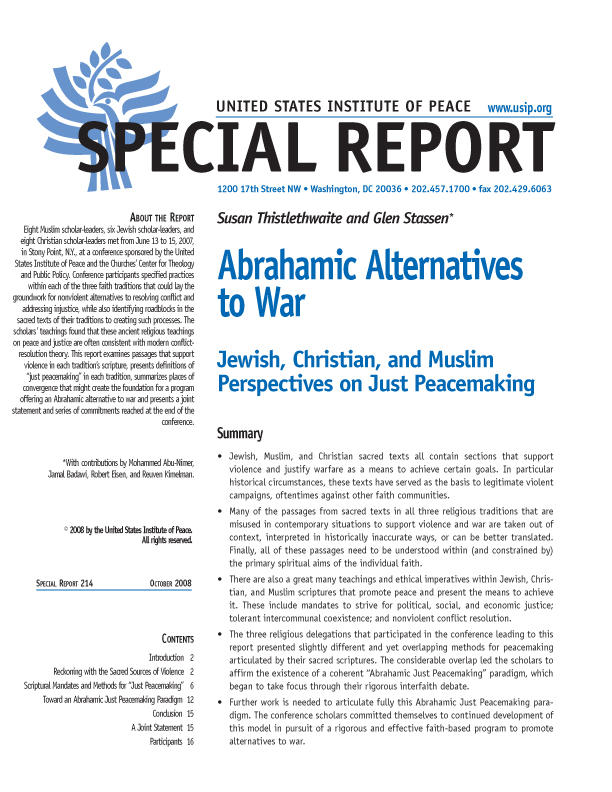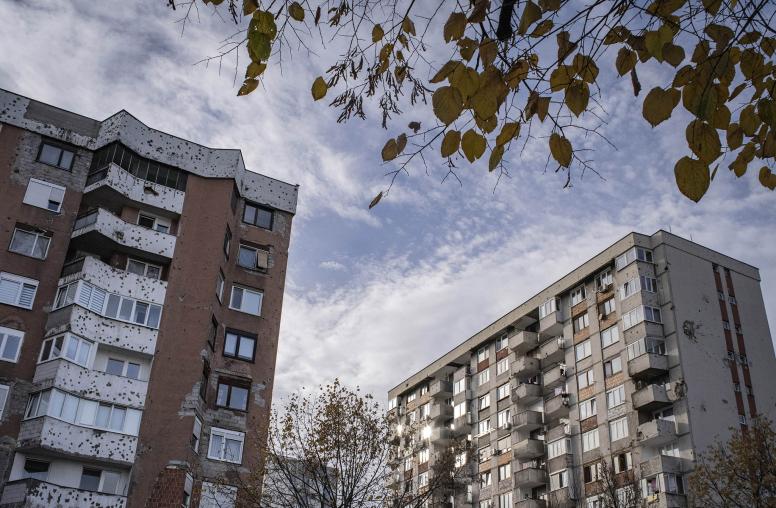Abrahamic Alternatives to War: Jewish, Christian, and Muslim Perspectives on Just Peacemaking
Eight Muslim scholar-leaders, six Jewish scholar-leaders, and eight Christian scholar-leaders met from June 13 to 15, 2007, in Stony Point, N.Y., at a conference sponsored by the United States Institute of Peace and the Churches’ Center for Theology and Public Policy. The purpose of the conference, titled Alternatives to War, was to specify practices within each of the three Abrahamic traditions that could lay the groundwork for a nonviolent program to resolve global conflict and address injustice.

Summary
- Jewish, Muslim, and Christian sacred texts all contain sections that support violence and justify warfare as a means to achieve certain goals. In particular historical circumstances, these texts have served as the basis to legitimate violent campaigns, oftentimes against other faith communities.
- Many of the passages from sacred texts in all three religious traditions that are misused in contemporary situations to support violence and war are taken out of context, interpreted in historically inaccurate ways, or can be better translated. Finally, all of these passages need to be understood within (and constrained by) the primary spiritual aims of the individual faith.
- There are also a great many teachings and ethical imperatives within Jewish, Christian, and Muslim scriptures that promote peace and present the means to achieve it. These include mandates to strive for political, social, and economic justice; tolerant intercommunal coexistence; and nonviolent conflict resolution.
- The three religious delegations that participated in the conference leading to this report presented slightly different and yet overlapping methods for peacemaking articulated by their sacred scriptures. The considerable overlap led the scholars to affirm the existence of a coherent “Abrahamic Just Peacemaking” paradigm, which began to take focus through their rigorous interfaith debate.
- Further work is needed to articulate fully this Abrahamic Just Peacemaking paradigm. The conference scholars committed themselves to continued development of this model in pursuit of a rigorous and effective faith-based program to promote alternatives to war.
About the Report
Eight Muslim scholar-leaders, six Jewish scholar-leaders, and eight Christian scholar-leaders met from June 13 to 15, 2007, in Stony Point, N.Y., at a conference sponsored by the United States Institute of Peace and the Churches’ Center for Theology and Public Policy. Conference participants specified practices within each of the three faith traditions that could lay the groundwork for nonviolent alternatives to resolving conflict and addressing injustice, while also identifying roadblocks in the sacred texts of their traditions to creating such processes. The scholars ’ teachings found that these ancient religious teachings on peace and justice are often consistent with modern conflict-resolution theory. This report examines passages that support violence in each tradition’s scripture, presents definitions of “just peacemaking” in each tradition, summarizes places of convergence that might create the foundation for a program offering an Abrahamic alternative to war and presents a joint statement and series of commitments reached at the end of the conference.
*With contributions by Mohammed Abu-Nimer, Jamal Badawi, Robert Eisen, and Reuven Kimelman.



